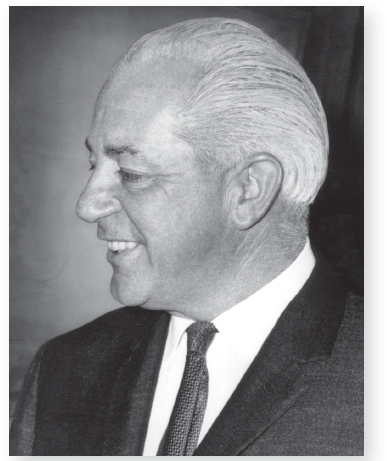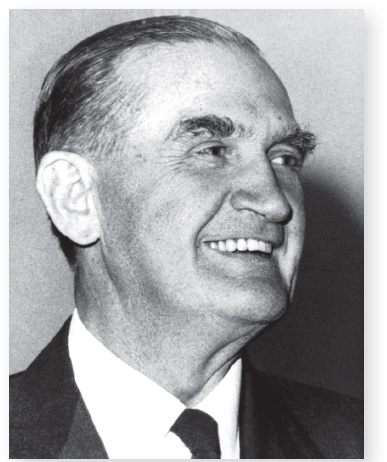First Among Equals (8 page)
Read First Among Equals Online
Authors: Kim; Derry Hogue; Wildman

On 3 September 1939, Britain declared war on Germany. Without consulting cabinet Menzies announced that Australia, too, was at war. He then began mobilising the country's war effort, establishing a war cabinet and introducing censorship, price controls, conscription for home defence and petrol rationing. In 1940 Menzies sent Australian troops to fight in Europe and North Africa.
While Menzies' government survived the 1940
election with the support of two independents, disenchantment with his leadership was growing. In early 1941 Menzies travelled to Britain to discuss war strategies with Winston Churchill. On his return, having lost the support of his party, he was forced to resign and was replaced by Arthur Fadden in August 1941.
Menzies then retired to the backbench before returning to his legal practice in Melbourne. However, after the Coalition's humiliating 1943 election defeat, Menzies was reinstated as leader of the UAP. He quickly worked to reunite the demoralised party under the new banner of the Liberal Party of Australia and rebuild their alliance with the Country Party. With the electorate unhappy with Ben Chifley's plan to nationalise banks and tiring of the prolonged coalmine strikes, Menzies easily won the December 1949 election and again became prime minister.
In 1951 Menzies attempted to outlaw and dissolve the Australian Communist Party. However, the Labor Party retained control of the Senate and fought the bill. While the bill was eventually passed by parliament it was stopped by the High Court which ruled it unconstitutional. As a result the Labor Party split and Menzies requested a double dissolution, consequently gaining control of both Houses. He then called for a referendum to change the Constitution and push through the bill, however, it was defeated.
In an effort to increase his popularity, Menzies played on Communist fears in his campaign for the 1954 election. On the eve of the election, he announced to a stunned parliament that a Soviet diplomat, Vladimir Petrov, had defected and that there was evidence of Soviet spying in Australia. He consequently won the election, but with a reduced minority.
A staunch monarchist, Menzies stringently upheld the traditional view of British Empire. In 1950 Menzies sent Australian forces to combat Communist guerrillas in Malaya, committed Australia to the Korean War and supported British and French intervention in the Suez Canal Crisis of 1956. He was later rewarded for his loyalty and knighted by the Queen in 1963.
Much of the 1950s was marked by good fortune for Menzies. With the Labor Party in disarray and the economy on a high, Menzies easily won the 1955 and 1958 elections. A decade later his fortunes began to change. In late 1960, in an effort to restrain inflation, the Menzies government applied a credit squeeze, which caused unemployment to rise. Then in 1964 he reintroduced conscription and in 1965 committed Australian troops to Vietnam.
On 26 January 1966, Menzies, at the age of 71, announced his retirement. Harold Holt became the new leader of the Liberal Party and prime minister. Following his retirement, Menzies became chancellor
of the University of Melbourne. He was also granted one of the highest British awards, becoming Lord Warden of the Cinque Ports. Menzies died on 15 May 1978 in Melbourne. As Australia's longest-serving prime minister, his state funeral was broadcast around the country.

HAROLD EDWARD HOLT
LOST AT SEA
TERM
26 January 1966-19 December 1967
O
n 26 January 1966 Harold Edward Holt emerged, after 32 years as a federal parliamentarian, from behind the long shadow of Robert Menzies to take over the leadership of the country. The third prime minister to die in office, Holt is most remembered for the mysterious circumstances surrounding his death.
Born in Sydney on 5 August 1908, Holt was the eldest of two sons of Thomas and Olive Holt. Holt's parents divorced when he was ten years old and a year later he was sent to board at Wesley College in Melbourne, the same school attended by Menzies. A good student and hard worker, Holt won a scholarship for his leadership qualities and sporting abilities. Tragically, Holt's mother died when he was sixteen.
Holt attended the University of Melbourne where he took up debating and studied law. In 1926 he met his future wife, Zara Dickens. As he would not marry Zara until he could support her, she met and married an English cavalry officer. Only after her divorce did the couple eventually marry in 1946, with Holt adopting her three children.
Graduating in 1930, Holt worked for a local solicitor's firm and was admitted to the Bar in 1932. He then became secretary to the Victorian Cinematograph Exhibitors' Association and an active member of the Young Nationalists. In 1933 Holt joined the United Australia Party (UAP) and in 1934 unsuccessfully stood
for the federal seat of Yarra. Then, at the age of 27, Holt became one of the youngest members ever elected to parliament, winning the seat of Fawkner in a byelection in 1935.
Holt was a backbencher in the Lyons government for four years, before being appointed as a minister without portfolio to Menzies' government when the UAP came to power following Lyons' death in 1939. In 1940 Holt enlisted in the army but, after five months, Menzies recalled him to parliament following the death of three cabinet ministers in an air crash. Holt was then appointed the minister for labour and national service and in 1941 introduced the
Child Endowment Act
. Holt, however, was relegated to the opposition backbench when Labor won power in 1941.
Following Menzies' 1949 victory, Holt was again appointed as the minister for labour and national service and was also given the immigration portfolio. He began to make changes to the White Australia policy, which had been in practice since 1901. Holt soon rose through the Liberal Party ranks, becoming deputy leader in 1956 and federal treasurer two years later. While treasurer, Holt had many achievements, including establishing the Reserve Bank; however, his 1960 budget triggered the country's greatest credit squeeze since 1945 and almost brought down the government.
In January 1966 when Menzies retired, Holt, at the age of 57, succeeded him, becoming Australia's seventeenth prime minister. Stepping into the post during the âSwinging Sixties', Holt found the mood of the country was changing and anguish was growing over Australia's involvement in the Vietnam War. With the war intensifying, Holt flew to the US to meet with President LB Johnson and in a speech reported in
The Australian
adopted the âAll the way with LBJ' slogan, confirming his continued support of America's Vietnam policy. When Johnson visited Australia later that year, the tour, the first ever by an American president, ignited violent anti-war demonstrations.
Despite growing opposition to the war, Holt was returned to office in the November 1966 election. The following year was tumultuous for Holt's government. While the government ran a successful âyes' campaign for a constitutional referendum to include Aborigines in the national census, it also made a number of blunders including an embarrassing controversy over the alleged misuse of a VIP aircraft. which ultimately saw the government lose control of the Senate. Then, Holt disappeared while swimming in heavy surf near Portsea, Victoria, on 17 December 1967. His body has never been found and rumours and theories surrounding the circumstances of his disappearance continue to this day.
On 22 December 1967, a memorial service was held at St Paul's Cathedral, Melbourne, and was attended by US President LB Johnson, the Prince of Wales, British Prime Minister Harold Wilson and a large contingent of international dignitaries.

SIR JOHN MCEWEN
THE MAN THEY CALLED âBLACK JACK'
TERM
19 December 1967-10 January 1968
F
ollowing Harold Holt's dramatic disappearance, John McEwen, then deputy prime minister and leader of the Country Party, was appointed caretaker prime minister on 19 December 1967. McEwen's impact on Australian politics was much greater than his 23-day tenure suggests. The only leader of the Coalition never to be defeated in a general election, McEwen served as deputy prime minister for twelve years and also served as acting prime minister on several occasions.
McEwen was born in Chiltern, Victoria, on 29 March 1900. Sadly, both his parents died while he was young. He and his sister Amy were then raised by their grandmother in Wangaratta. After moving to Melbourne, McEwen left school at the age of thirteen to help support the family, though he continued his education at night school. After passing an examination for the Commonwealth Public Service, he was employed as a junior clerk with the Commonwealth Crown Solicitor's office at the age of sixteen, and worked under Fred Whitlam, Gough Whitlam's father.
In 1918 McEwen enlisted in the Australian Imperial Force, but the war ended before he could join the army in France. After he was discharged, McEwen was granted land under the Soldier Resettlement Scheme at Stanhope in Victoria where he started up a dairy farm, though he later switched to grazing sheep. In 1919 McEwen joined the Victorian Farmers' Union and
then, on 21 September 1921, married Anne McLeod, the daughter of a farmer.
McEwen first attempted to enter parliament in 1932, standing unsuccessfully as Country Party candidate for the seat of Waranga in the state election. Undeterred, he went on to win the federal seat of Echuca two years later. In 1937 McEwen was appointed the minister for the interior by Joseph Lyons, and then when Menzies came to power following Lyons' death, became the minister for external affairs. His most significant act in this position was aiding a coup to overthrow the pro-Vichy French administration in New Caledonia, thus ensuring that when Japan entered the war in December 1941, New Caledonia was in Allied hands.
When Archie Cameron resigned as leader of the Country Party in October 1940, McEwen contested the leadership. With the vote split between him and his opponent Earle Page, Arthur Fadden was handed the leadership. Fadden served as leader for the next eighteen years, taking over the office of prime minister briefly in 1941. Meanwhile, with World War II in full swing, McEwen served on the War Council in 1940, then on the all-party Advisory War Council until the end of the war in 1945.
In the lead-up to the 1949 election, the Country Party formed a coalition with Menzies' Liberal Party. When Menzies then became prime minister, McEwen was appointed minister for commerce and agriculture,
a position he held until 11 January 1956, when he became minister for trade. During this time he worked tirelessly to stabilise Australia's primary industries. He was also a key figure in negotiating Australia's international trade agreements with Britain and Japan, earning himself the nickname âBlack Jack'.
On Fadden's retirement on 26 March 1958, McEwen became both Country Party leader and deputy prime minister under the Menzies and Holt coalition governments. As deputy prime minister when Holt disappeared, McEwen became the country's third caretaker prime minister. With the Liberal Party the stronger coalition partner, McEwen worked quickly to blackball William McMahon, Holt's most likely successor, announcing that he would break the coalition if McMahon took office. John Gorton was then elected as the new Liberal Party leader and became prime minister in 1968.
Under Gorton, McEwen served as the minister for trade. Following Gorton's poor performance and the Coalition's near defeat in the October 1969 election, McEwen eventually lifted his veto on McMahon. In 1971 at the age of 70, McEwen retired from parliament. He then lived quietly on his property at Stanhope with his second wife Mary Byrne, whom he married in 1968 after Anne died, until his death almost ten years later on 20 November 1980.

